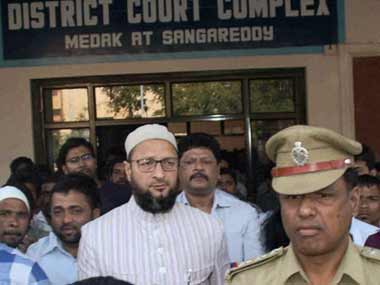Asaduddin Owaisi, the incendiary boss of the All-India Majlis-e-Ittehadul Muslimeen (AIMIM), has set the cat among the pigeons by deciding to contest 24 seats in the Muslim-dominated constituencies of Bihar in the forthcoming assembly elections. His entry has drawn muted protests from phony secularists — both in the political arena and in the media — for allegedly weakening the fight against the “communal” BJP. The main arguments used to criticise Owaisi’s foray are these: that he will be “dividing” Muslim votes and hence play spoiler for the “secularists” in these elections; moreover, he may even be a BJP agent. Since the BJP is not complaining, the “secular” cabal feels its charge against Owaisi will be believable. [caption id=“attachment_2435922” align=“alignleft” width=“380”]  Asaduddin Owaisi. PTI[/caption] Another, but different, line of argument is that since Bihar under Lalu Prasad and Nitish Kumar has seen no major communal riot after Bhagalpur in the late 1980s, Muslims will not be attracted to Owaisi's brand of politics. All these arguments are flawed. While the JD(U)-RJD-Congress alliance will be hit hard if Owaisi actually manages to wean away some Muslim votes in Bihar, the question that begs asking is this: if the “secular” parties have been such a boon to marginalised Muslim communities in India, why are they so scared of Owaisi? Why would Muslims vote for Owaisi if they had gotten a better deal from the “secular” parties? As Owaisi himself put it colourfully in a recent TV interview: “Humko dekhkar unhe pet me dard kyon hota hai? Apni kamjori ko hamaare ghar ke saamne rakhe to hum kya kare.” The fear of Owaisi, who is actually attempting nothing more – and nothing less – than what every other regional party has attempted more or less successfully, exposes the phony nature of mainstream Indian “secularism” as never before. For several reasons. First, the very idea that Muslim votes should not be “divided” is communal. Nobody stops to think what this implies. It means Muslims must vote as a block, and not according to where they think their interests lie. Now if voting as a block is all right for Muslims, why not for Hindus or other communities? Why castigate the BJP for seeking a Hindu consolidation when “secular” parties want a Muslim consolidation? So, to argue that Owaisi must not divide Muslim votes is patently wrong. Second, arguing that Muslims have no need for Owaisi since there were no communal riots in some states is worse. As Owaisi himself observed in a TV show recently, is the protection of life and limb some kind of favour shown by “secularists” to Muslims? Isn’t that the duty of the state, and all elected governments? Or were “secular” parties merely running protection rackets for the minorities, using the BJP and the RSS to scare Muslims into voting for them? Third, how is it fair to argue that the Bahujan Samaj Party is “progressive” because it organises Dalits into a voting bloc, but it is somehow wrong for Owaisi to do the same with Muslims? Is it all right for Mulayam Singh and Lalu Yadav to shamelessly garner Yadav votes but wrong of Owaisi to try to create a Muslim vote by appealing to their sense of grievance and/or communal instincts? Is caste-based communalism absolutely fine but not religion-based communalism? Fourth, the challenge before all parties – from BJP to the Congress to all regional parties – is to focus on Muslim economic deprivation and not just be happy with providing them security. If there is a Muslim party fighting not just for the community’s security, but for their economic interests too, how much more harm can it do than the harm the secularists have already done to create mistrust between Hindus and Muslims? Fifth, while the initial impact of Owaisi’s politics may indirectly benefit the BJP, in the long run, he will end up forcing “secularists” to confront the truth. If he succeeds, he could consolidate Muslim votes under a party (or group of parties) built on the Muslim identity. This is no different from what is the case already in Kerala, where the Indian Union Muslim League claims to represent Muslims and is the most powerful political force after the Congress and CPM. Two, even if he does not succeed, Owaisi’s foray in Bihar (and elsewhere) will force other secular parties to really start doing something for Muslims beyond pretending to protect life and limb. One may not love Owaisi’s brand of politics, but it is a darn sight more honest than the phony secularism practiced by our mainstream parties where Muslims are cheated economically in the name of protecting them from “communalism”. We can’t say which way Muslim politics will be headed if Owaisi succeeds (or fails), but at the very least he will have forced a rethink on secularism that is more about ghettoising Muslims than mainstreaming them. He could well be a force for some good.
The entry of AIMIM in the Bihar assembly polls holds up a mirror to secular politicians who think this will only divide the Muslim vote and help the BJP. But do “secular” parties have a god-given permanent right to the Muslim vote?
Advertisement
End of Article
Written by R Jagannathan
R Jagannathan is the Editor-in-Chief of Firstpost. see more


)
)
)
)
)
)
)
)
)



